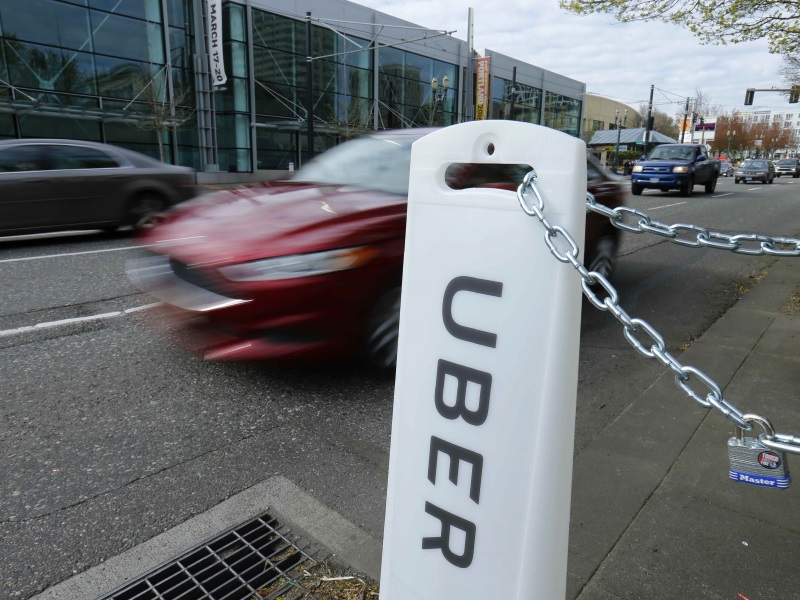Uber's Self-Driving Unit Quietly Bought Firm With Tech at Heart of Alphabet Lawsuit

A company now owned by Uber last year quietly bought a small firm specialising in sensor technology used in autonomous vehicles, giving the ride services company a patent in the technology and possibly a defense against a trade secrets theft lawsuit filed against it by rival Alphabet Inc.
The chief executive of little-known Tyto Lidar LLC said in a May 2016 post on LinkedIn that the company had been sold, at the same time as he and three other executives joined Otto, according to their profiles on the online business network. Official US patent data shows Otto acquired Tyto technology at the same time.
Otto, a self-driving truck startup founded by former Alphabet employees, was bought by Uber in August.
The unpublicised acquisition may become a factor in the high-stakes legal fight between Uber and Alphabet, the parent of Google, as the two Silicon Valley companies aggressively develop self-driving technology, widely seen as the future of private road transport in the United States.
Equally, it may end up being a footnote in the complex litigation, which could take years to unfold.
Alphabet's autonomous car unit Waymo sued Uber and Otto last week, alleging that former employee Anthony Levandowski, who left Waymo to set up Otto, downloaded and stole more than 14,000 confidential files, including details on light detection and ranging sensor technology, known as Lidar, a crucial element in most self-driving car systems.
It claimed that without those Waymo designs, Uber could not have developed its technology as fast as it says.
An Uber spokesperson declined to comment on Tyto, citing the pending litigation, but called Waymo's lawsuit "a baseless attempt to slow down a competitor." Waymo declined to comment on Tyto.
'Striking resemblance'
In its lawsuit, Waymo said that by mid-2016, Uber was "more than five years behind in the race to develop vehicle automation technology suitable for the mass market," yet it built a Lidar system comparable to Waymo's "in only nine months".
However, the acquisition of Tyto means that at least two executives with long experience in Lidar - one as early as 2009, according to his LinkedIn profile - transferred to Otto and then Uber. Both had previously worked at Velodyne, another Silicon Valley Lidar pioneer, according to LinkedIn.
Tyto also came to Otto with a patent for a Lidar scanner that was filed in 2013 and has since been reassigned to Uber, according to the US Patent & Trademark Office website.
Eric Goldman, an intellectual property (IP) law professor at Silicon Valley's Santa Clara University School of Law, said the Tyto acquisition and its patent "could help rebut" Waymo's suggestion that Uber scaled up too quickly to have its own Lidar technology.
Trade secret plaintiffs commonly make circumstantial cases, such as Waymo implying that Uber could not have developed its own technology as fast as it purported to do, Goldman said.
"That prong of their arguments could be rebutted," Goldman said.
He cautioned, however, that Tyto's expertise and patent "may be irrelevant" if Waymo can prove its central allegation: that Levandowski downloaded confidential trade secrets before leaving the company to form Otto - and that Uber exploited this stolen information to design a Lidar circuit board with a "striking resemblance" to Waymo's.
In an interview with Forbes in October that was published on Tuesday, Levandowski said Uber did not steal trade secrets from Google. "We did not steal any Google IP," he told the magazine.
Waymo says its patented Lidar technology is among its most valuable assets because it had successfully managed to reduce the price of the sensor by 90 percent.
All Lidar makers are seeking to reduce cost and size. Promotional material for Tyto from a 2015 trade conference said Tyto's technology "enables lower cost, lighter weight and smaller size Lidar sensors."
© Thomson Reuters 2017
Catch the latest from the Consumer Electronics Show on Gadgets 360, at our CES 2025 hub.
Related Stories
- Samsung Galaxy Unpacked 2025
- ChatGPT
- Redmi Note 14 Pro+
- iPhone 16
- Apple Vision Pro
- Oneplus 12
- OnePlus Nord CE 3 Lite 5G
- iPhone 13
- Xiaomi 14 Pro
- Oppo Find N3
- Tecno Spark Go (2023)
- Realme V30
- Best Phones Under 25000
- Samsung Galaxy S24 Series
- Cryptocurrency
- iQoo 12
- Samsung Galaxy S24 Ultra
- Giottus
- Samsung Galaxy Z Flip 5
- Apple 'Scary Fast'
- Housefull 5
- GoPro Hero 12 Black Review
- Invincible Season 2
- JioGlass
- HD Ready TV
- Laptop Under 50000
- Smartwatch Under 10000
- Latest Mobile Phones
- Compare Phones
- Huawei Nova 13i
- Itel A80
- HMD Key
- Redmi Turbo 4
- Vivo Y200+
- Lava Yuva 2 5G
- OnePlus Ace 5
- OnePlus Ace 5 Pro
- Asus Zenbook S 14
- MacBook Pro 16-inch (M4 Max, 2024)
- Honor Pad X9 Pro
- Honor Pad V9
- boAt Enigma Gem
- boAt Enigma Daze
- Sony 65 Inches Ultra HD (4K) LED Smart TV (KD-65X74L)
- TCL 55 Inches Ultra HD (4K) LED Smart TV (55C61B)
- Sony PlayStation 5 Pro
- Sony PlayStation 5 Slim Digital Edition
- Blue Star 1.5 Ton 3 Star Inverter Split AC (IC318DNUHC)
- Blue Star 1.5 Ton 3 Star Inverter Split AC (IA318VKU)
















